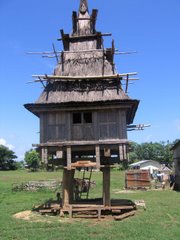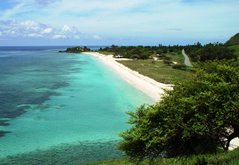The press release below states what we've always known here - Timor Leste has some of the world's best diving. It also has two excellent dive centres:
Dive Timor Lorosae (
http://www.divetimor.com/)
and FreeFlow (
http://www.freeflowdiving.com)/Come over and see for yourself - this is the best time of year for it!
---000---
Coral Triangle Initiative (CTI) Endorsed by APEC Summit
21 world leaders endorse proposal for new effort to safeguard the rich
marine resources of the Indo-Pacific region
SYDNEY, AUSTRALIA — September 10, 2007 — At yesterday's Asia Pacific
Economic Cooperation (APEC) summit, 21 world leaders endorsed a new
proposal to safeguard the rich marine resources of the Indo-Pacific
region for future generations. The Coral Triangle Initiative (CTI) on
Coral Reefs, Fisheries, and Food Security aims to bring together six
governments in a multilateral partnership to conserve the
extraordinary marine life in the region. The proposal was endorsed in
the Sydney APEC Leaders' Declaration on Climate Change, Energy
Security and Clean Development. U.S. President George W. Bush welcomed
this Initiative during the Summit.
The Coral Triangle (CT) covers all or parts of the exclusive economic
zones of Indonesia (Central and Eastern), East Timor, the Philippines,
Malaysia (part of Borneo), Papua New Guinea and the Solomon Islands.
Defined by areas containing 500 or more species of coral, the Coral
Triangle, sometimes referred to as the "Amazon of the Seas", is the
epicenter of marine life abundance and diversity on the planet. It has
more than 600 coral species in some areas (more than 75% of all known
coral species), 53% of the world's coral reefs, 3,000 fish species,
and the greatest extent of mangrove forests of any region in the world.
According to scientists, these marine biological resources are at
risk, threatened by a range of factors, such as over-fishing,
destructive fishing practices, pollution and climate change. This new
initiative would address these threats and ensure long-term benefits
from the marine biological resources of the region.
Rebecca Patton, Chief Conservation Strategies Officer with The Nature
Conservancy, and WWF US's Chief Conservation Officer, Ginette Hemley,
praised the endorsement of this new initiative. "The Coral Triangle
Initiative is an incredible step forward for conservation. The
protection of these coral reefs and the life they support will help
our planet cope with a changing climate and ensure the livelihoods for
well over 100 million people," noted Patton. "The initiative shown by
the APEC economies is to be applauded," Hemley added.
The biological resources of the Coral Triangle directly sustain the
lives of over 120 million people living within this area, and benefit
millions more worldwide. Primary human benefits include:
* Livelihoods, income, and food security -- particularly for
populations living along coastlines within the region
* Total annual value of coral reefs, mangroves & associated
natural habitats within the CT are estimated at US $2.3 billion
* Tuna spawning & nursery grounds support a multi-billion tuna
industry, and provide for millions of consumers worldwide
* Healthy marine resources contribute to a growing nature-based
tourism industry in the region
* Healthy reefs systems and mangroves protect coastal communities
from storms and tsunamis, reducing future reconstruction costs and the
need for international aid
Possible linkages between the CTI and climate change were highlighted
during the APEC Summit. As part of a comprehensive approach to
climate change, the future impacts of climate change on our marine and
coastal natural resources must be addressed in addition to significant
reductions in emissions. Adaptation actions that can help to protect
and sustain these resources, such as creating networks of marine
reserves that are effectively designed for resilience to climate
change, would be a central element of the CTI and essential to the
human communities who depend on these resources.
The Nature Conservancy is a leading conservation organization working
around the world to protect ecologically important lands and waters
for nature and people. To date, the Conservancy and its more than one
million members have been responsible for the protection of more than
15 million acres in the United States and have helped preserve more
than 102 million acres in Latin America, the Caribbean, Asia and the
Pacific. Visit The Nature Conservancy on the Web at www.nature.org.
About World Wildlife Fund
Known in the United States as World Wildlife Fund and recognized
worldwide by its panda logo, WWF leads international efforts to
protect endangered species and their habitats and to conserve the
diversity of life on Earth. Now in its fifth decade, WWF, the global
conservation organization, works in more than 100 countries around the
world.
.jpg)


